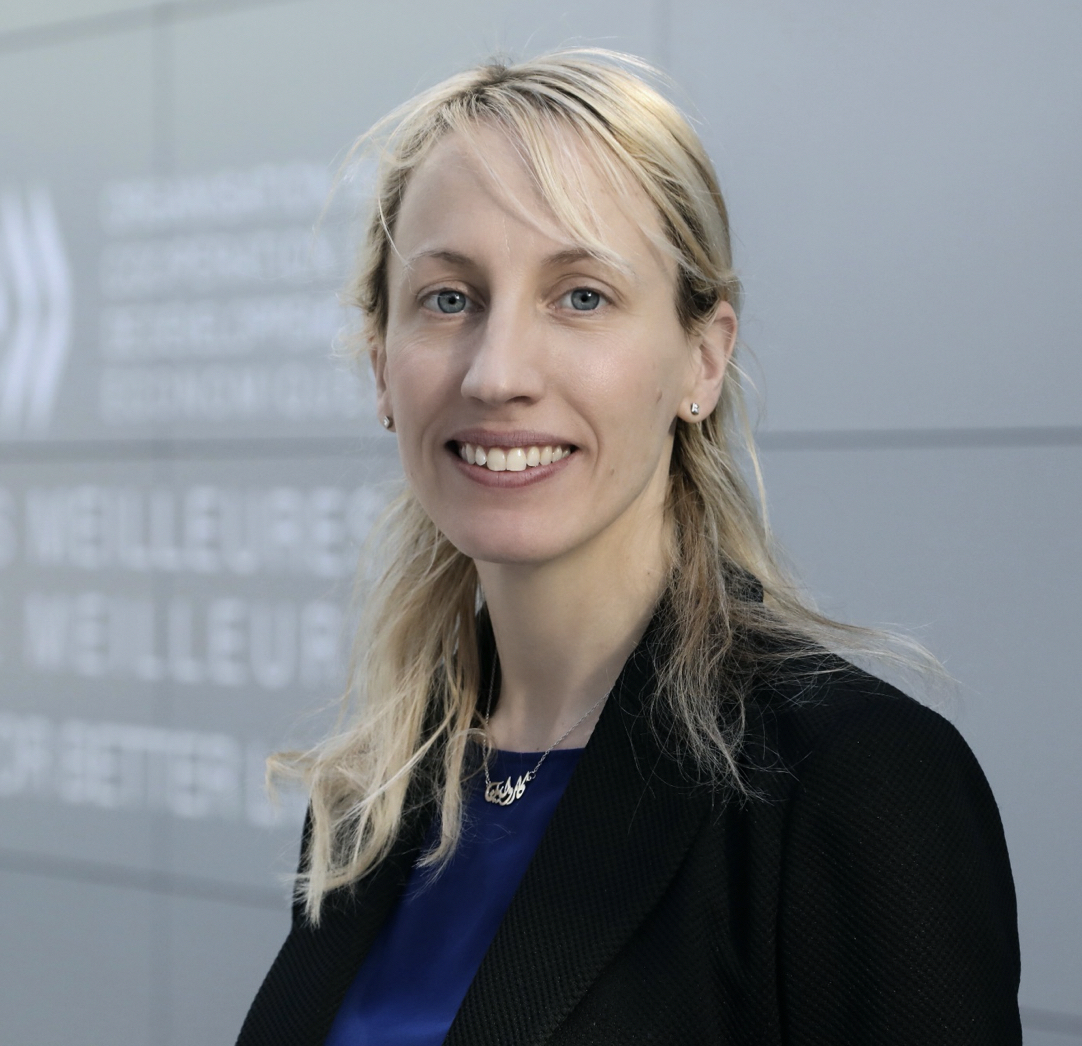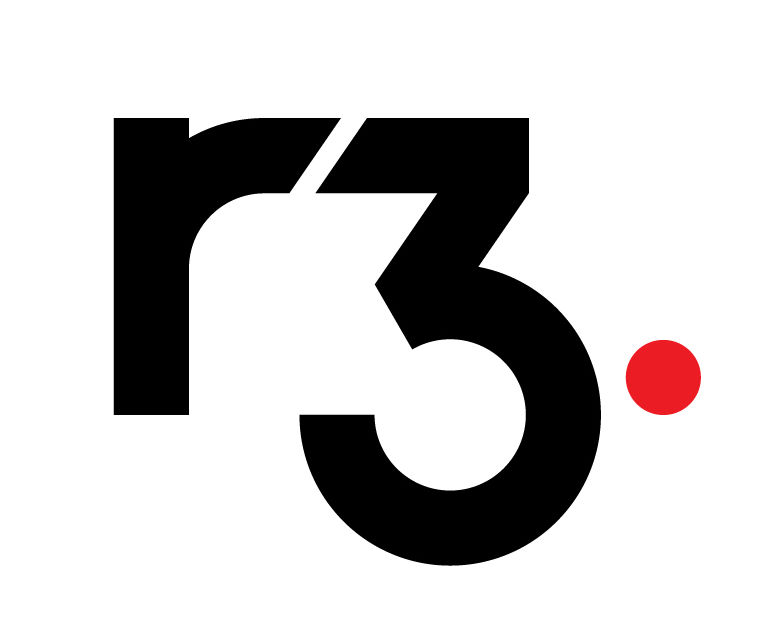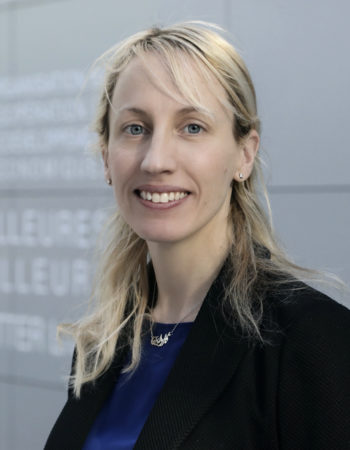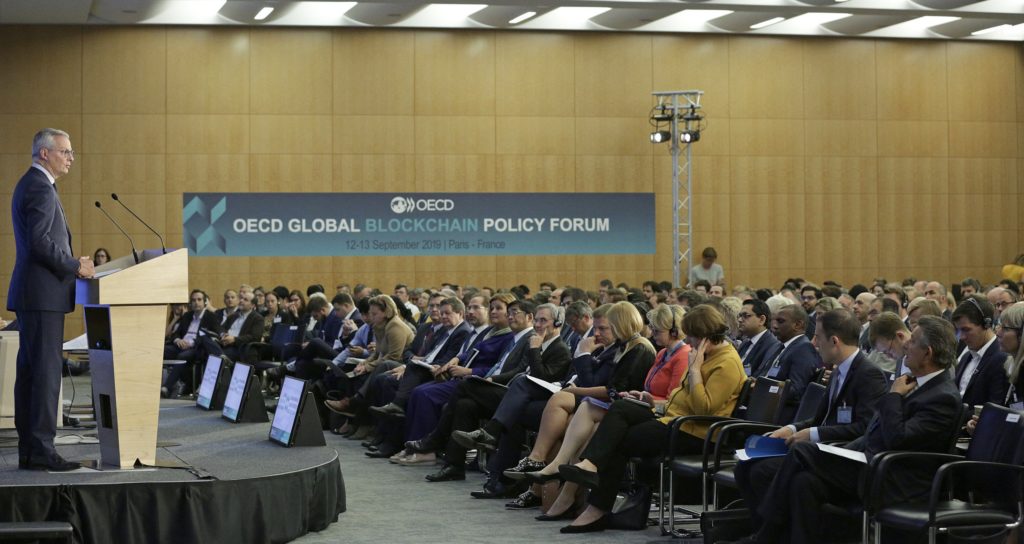
Caroline Malcolm heads the Global Blockchain Policy Centre at the OECD, assessing its policy implications & building solutions to ensure governments across the world can access and respond to the opportunities and challenges it raises.
In this podcast she discusses with us the interesting work the OECD is doing around understanding the potential blockchain can bring to the its members, how they collaborate with other international institutions and she also invites you all to participate in the upcoming OECD Global Blockchain Policy Forum 2020 .
What is blockchain?
Caroline agrees that there is a wide range of views regarding defining what is blockchain.
For the OECD, blockchain is just one type of distributed ledger technology (DLT) and refers itself to a combination of technologies. These technologies create a digital, shared and self-updating ledger of verified transactions or information amongst parties on a network. These blockchains and DLTs more broadly use various types of consensus mechanisms to validate and record those transactions or transfer of information.
They have various governance systems with various degrees of control for the different parties on the network. Blockchain applications have been developed across lots of different sectors, and is often described as the Internet of value.
What is the OECD?
The Organisation for Economic Co-operation and Development (OECD) is an international organisation that works to build better policies for better lives. Their goal is to shape policies that foster prosperity, equality, opportunity and well-being for all.
The OECD is an international organisation with at the present moment 37 members, including Colombia who recently joined. Together with governments, policy makers and citizens, the OECD works on establishing evidence-based international standards and finding solutions to a range of social, economic and environmental challenges. From improving economic performance and creating jobs, to fostering strong education, informing the impact of emerging technologies such as AI and blockchain, to fighting international tax evasion, they provide a unique forum and knowledge hub for data and analysis, exchange of experiences, best-practice sharing, and advice on public policies and international standard-setting.
The OECD Global Blockchain Policy Centre
For the last 6 years the OECD has been looking at cryptocurrencies and their impacts and potential for financial markets. In 2017, the OECD launched a project called Going Digital which broadly looked at digitalization across the policy spectrum. Within 18 months of that project being underway the OECD members decided that going forward they would put their focus on artificial intelligence and on blockchain.
In 2018 the OECD Global Blockchain Policy Centre was created and in 2019 the OECD AI Policy Observatory was created.
The OECD Global Blockchain Policy Centre was created to support governments to address the challenges raised by DLT and their applications as well as to seize the opportunities it offers for achieving policy objectives. The Centre focuses a significant amount of effort on education – capacity building and focusing on what that means for policy makers.
Caroline and her team recognised that there was a huge lack of understanding about why this technology was not just like any other emerging technology. The decentralised aspect of the technology was what policymakers and regulators need to be paying special attention to.
The Centre created their own course for policymakers to help them get a better understanding of what is the technology, what it’s useful for, what it’s not useful for and help them understand how it is changing the policy implementation environment.
Caroline recognises that striking the balance between a healthy scepticism about blockchain technology and the hype associated with it to recognising with a certain humility that we have seen in the past emerging technologies that have developed and grown into something that we may not have been able to envision.
Since 2018 the Centre runs the Global Blockchain Policy Forum on an annual basis to show the potential of blockchain technology without it being overhyped but concrete and realistic. In 2019 the forum and even more for the 2020 forum is focused on demonstrating that blockchain isn’t something for the future but a technology that is happening now.
The OECD Global Blockchain Policy Centre’s work
The OECD Global Blockchain Policy Centre’s work sits in four categories:
- Finance
- Supply chains
- Government and public goods
- Governing blockchain
Finance
The finance category involves work on financial consumer protection in the crypto asset space and asset tokenization. It also involves taxation work, sustainable infrastructure, and within the work of the Financial Action Task Force (FATF) they are looking at both virtual assets and digital identity.
Supply chain
This category is looked at from two aspects: track & trace of goods and a more qualitative aspect.
The track and trace of goods has come to the fore in a kind of post COVID world as society looks at preparing its systems to become more resilient in the future. COVID-19 has demonstrated that perhaps we don’t have a good understanding of our supply chains, and as much control and information and transparency as we thought we had.
With regards to the more qualitative aspect of supply chain and on the due diligence of supply chain. How to use technologies such as Internet of Things (IoT) to get a better understanding of what is happening in supply chain? It’s being able to see beyond just how a good is moved from point A to point B but to be able to see whether child labour or slave labour is being used within supply chains.
Government and public goods
This is about the delivery of public services for things like migration, development aid and sustainable development goals. It’s about using the technology for greater transparency to address corruption risks in aid delivery and ensure that when aid is given it is arriving to the intended recipient.
This category also looks at transport and how blockchain is being used for urban mobility.
Governing blockchain
It’s about digital identity, governance of decentralised systems and understanding the new business models that can arise from it. It’s understanding and working out what are the incentives in those decentralised models and how they are governed.
Cross institution collaboration
In 2019 the OECD crated this informal network along with the European Commission, the WTO, UNICEF, World Food Programme, The World Bank, IFC and the IMF to informally share information about the different projects that they are all working on and identify points of collaboration. One that really emerged quite quickly was around the issue of education for policymakers and for public sector officials for them to understand what does blockchain mean to them as a government official or as a policymaker.
The OECD is developing an online course for these government officials and policymakers to help them understand what is blockchain. The aforementioned international organisations are contributing mini modules to those courses along their areas of expertise.
Different approaches to blockchain
The OECD is composed of 37 member states from across the world. They recognise that there isn’t one size fits all with regards to the approach to be taken on blockchain. This reflects the various different sort of economic and government structures in different parts of the world.
The OECD tries to understand what are the different policy options if there’s been no policy steps already taken by a member state. When governments have started to make moves, the OECD analyses what they’ve done and why it fits in a particular circumstance and try to tease out lessons for other countries about what could actually be useful for them to apply in their own circumstances.
Public private partnerships
Within the private space one of the key challenges that often arises is around consortia. There can be challenges in terms of willingness to share information and how to reach a consortium agreement. Experts have shared with the OECD that when you have government involved it can actually sort of smooth the path to a more effective consortium.
In Singapore, a collaborative project was undertaken with the Monetary Authority of Singapore and a number of the regional banks looking at how to improve KYC processes. Through this public private collaboration it was realised that by sharing information amongst the participants you can get better outcomes for both the banks and the regulators to help them meet their obligations.
Startup community and the OECD
Caroline recognises that they need to be more involved with the startup communities. To help address this they held a startup showcase as part of their Global Blockchain Policy Forum in 2019. It was designed to not just to expose startups to a policy audience but also for policymakers to better understand the specific issues startups face.
The OECD is doing work on individual country studies such as one in Italy focused on the sort of small to medium enterprise sectors in those countries and their blockchain community. This is to gain an understanding of what stage of development and areas of focus does the startup community have and what government policies are in place to align with overall policy objectives.
For this year’s Global Blockchain Policy Forum they would like to showcase additional startups in a virtual way.
OECD’s approach to digital identity, AI and the Web 3.0
The OECD has a comprehensive approach to digital identity solutions that involve DLT based ones and none DLT ones. They take a technology neutral approach when considering the full spectrum of digital identities. The OECD collaborates with a number of organisations including the Financial Action Task Force on digital identity.
The OECD is also involved in the ISO’s Technical Committee on DLT in developing technical standards.
Caroline admits that up to now the OECD has looked at emerging Web 3.0 technologies in isolation. However, they are working on updating their 2017 Digital Economy Outlook this year which will look at how these technologies come together. For example, it will look at where blockchain might go if you get greater adoption of the Internet of Things.
How blockchain can help in the COVID pandemic?
The COVID-19 pandemic has presented a series of new and pressing challenges across sectors, from the unprecedented policies required to slow infection and support the economy by governments, to the impacts on business operations right through the supply chain.
As institutions have raced to adapt, questions of privacy, data security, and veracity of information have come to the fore. Governments and corporations have already turned to decentralised systems to address some of these concerns, while distributed ledger technologies like blockchain have attracted attention as a useful means of addressing specific fragilities and building future resilience.
On the 27th of May, the OECD ran a COVID-19 Blockchain Webinar with a number of delegates:
- Jessica Douglas, Blockchain Services Leader, UK and Ireland, IBM
- Riho Laast-Laas, Lead, Estonian Track-and-Trace Consortium
- Frank Ricotta, CEO and Co-Founder, BurstIQ
The delegates discussed the following topics:
- Supply chain management – a key area where DLT can play a role in improving it
- Track and trace – the example of the Estonia consortium demonstrated the value of having existing digital systems in place. For the last years, Estonia has made significant digital investments in the delivery of government services and management of information using emerging technologies such as blockchain. They were able to leverage that investment in building a track and trace application that addresses the concerns around data privacy
- Data sharing – the research foundry project has been working on how data can be collected by academics and research institutions by allowing them to retain ownership of that data and understanding where it ultimately ended up
OECD Global Blockchain Policy Forum 2020
In 2019 the OECD successful ran the OECD Global Blockchain Forum 2019 with a summary report that can be downloaded: “2019 OECD Global Blockchain Policy Forum Summary Report”.
For this year the OECD is going to launch their annual OECD Global Blockchain Policy Forum 2020 .
The event will run virtually from the 16th of November to the 20th of November 2020 and will convene government ministers and senior policy makers, industry leaders, academics and other stakeholders to:
- Discuss the leading applications and significant policy issues confronting the blockchain ecosystem in 2020, including asset tokenisation, central bank digital currencies, and self-sovereign identity
- Review the emerging policy responses including through the recent work of the OECD, and share best practices identified across the world
- Look ahead to emerging trends in the blockchain industry, and hear from stakeholders on how policy can best support viable and fit-for-purpose innovation and adoption of distributed ledger technologies
- Startups will be able to showcase what they’ve been doing to policy makers
As the event is being run virtually, Caroline wants to take the opportunity to enlarge the audience to the forum by including not just policy makers but also industry experts, general public and academics.
___________________________________________________________________________________________
This episode is brought to you by our friends and sponsors at R3. In this digital-first world, now more than ever, businesses need to modernize existing processes, systems and models – and enterprise blockchain provides the ideal solution for transacting directly and streamlining business operation.
Developed by R3, Corda is light years ahead of other blockchain platforms in terms of privacy, security, scalability and interoperability. And–because Corda was built to meet the stringent requirements of highly-regulated industries, it can be used by firms of any type or size and in any industry.
Blockchain applications built on Corda can reimagine and increase the potential of existing business networks, enabling direct and trusted transactions that eliminate friction and accelerate growth.
Check out r3.com to find out more.








